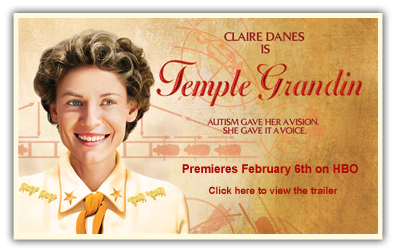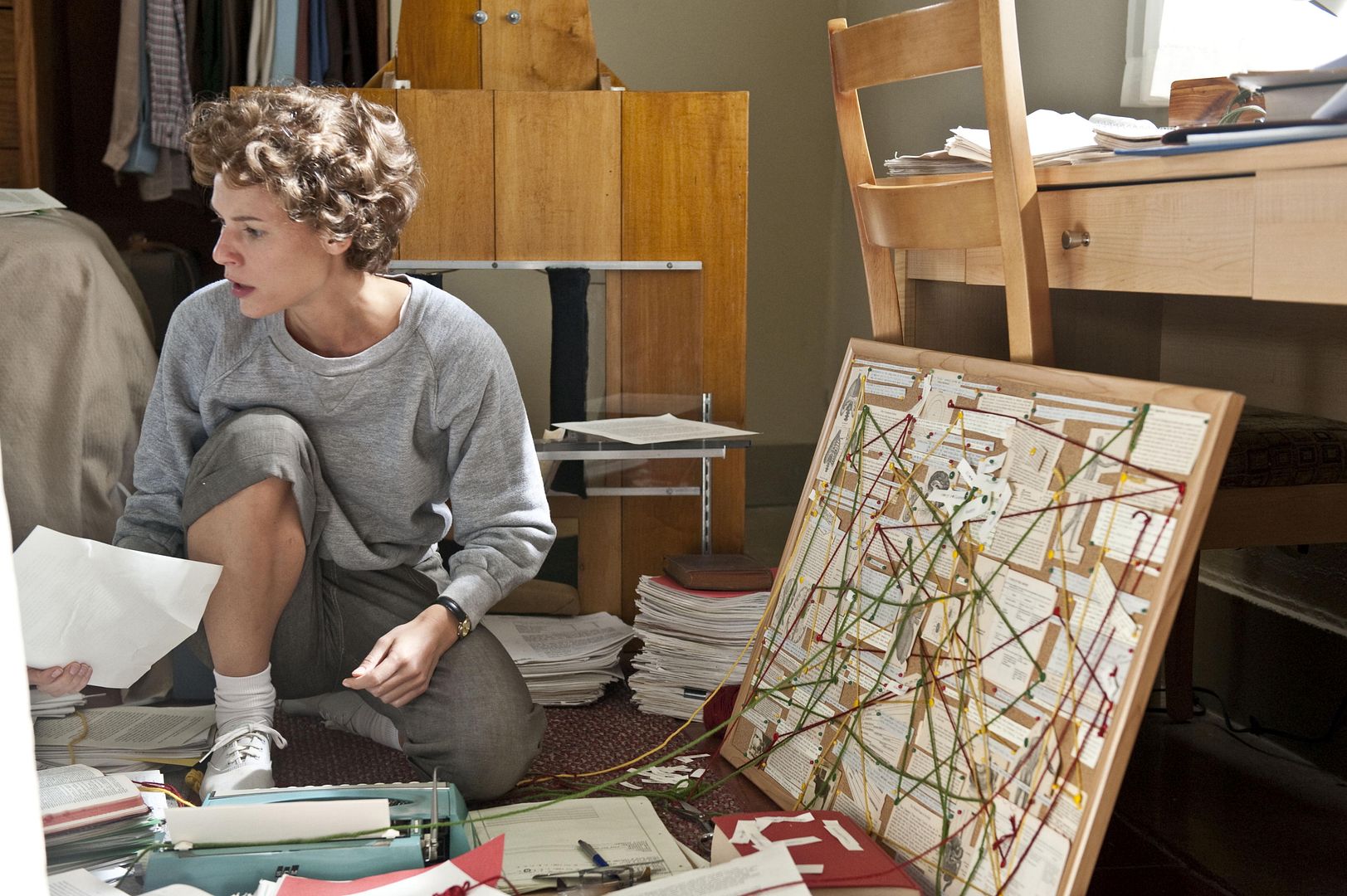
poster ©2010 Home Box Office, all rights reserved
This was a remarkable week for autism science and publicity. In a stunning and rare reversal, medical journal The Lancet retracted the 1998 paper responsible for suggesting a link between autism and MMR vaccinations, incurring over a decade of acrimonious debate and frightened parents. Ironic then that this should be the week when HBO premieres their new feature film Temple Grandin, about the eponymous world-famous scientist. Dr. Grandin has written and spoken openly about her struggle with autism and how it’s colored her view of the world and influenced the science she studies. ScriptPhD.com is extraordinarily honored to extend a warm welcome to friend and fellow blogger Susan Etlinger, author of the autism spectrum blog The Family Room, to review the biopic and interview the project’s executive producer. For full content, please click “continue reading.”
I cringe a little every time a new movie about someone with autism is released. It’s such a complicated and contentious topic, even more so because autism is a spectrum condition which can manifest in a dizzying number of ways. Like snowflakes, no two people with autism are alike.
Consider that Dustin Hoffman’s Rain Man—the obsessive, lovable card-counting savant—still remains many people’s icon of autism. Now consider that Kim Peek, the man who inspired the Rain Man character, was misdiagnosed as a child and wasn’t actually autistic at all.
And while films about autistic people usually focus on the experience of the people around them, it is a much more courageous task to convey the point of view of the autistic person himself or herself.
All of this makes the subject of Temple Grandin—author, internationally-known animal scientist, inventor and autism advocate—even more daunting. Her groundbreaking memoirs, including Emergence: Labeled Autistic and Thinking in Pictures, are generally agreed to have revolutionized our understanding of autism and the capabilities of people on the spectrum. So I approached HBO’s biopic, Temple Grandin, starring Claire Danes in the eponymous role, with a mixture of anticipation and dread.

The choices made by producer Emily Gerson Saines, director Mick Jackson and Danes herself are impeccable. Gerson Saines, herself the mother of a boy on the spectrum and a cofounder of the Autism Coalition for Research and Educaion (ACRE), which is now part of Autism Speaks, says that she had the script vetted by multiple people, Dr. Grandin included, to weed out even the remotest speck of inauthenticity. “There were a lot of eyes watching this script to make sure it was honest,” she told me in an interview for ScriptPhD.com earlier this week. “I was not going to mess it up.”
Diagnosed as a child with autism and “infantile schizophrenia,” (a label that has since been discredited), Temple Grandin was raised by her mother Eustacia (Julia Ormond), who refused to institutionalize Temple despite the doctor’s urging and the conventional wisdom of the time.
Rather, Eustacia chose to home-school Temple, sending her to her aunt’s farm for breaks, and enrolled her in a boarding school where Temple met Dr. Carlock (David Strathairn), a science teacher who was the first to appreciate the unique qualities of Temple’s mind; namely, her ability to think visually (in pictures) rather than narratively (in words). This opened up a whole world for Temple, giving her confidence and ultimately enabling her to channel her empathy for animals into a career that would change the cattle industry and lead to her future as a speaker, author and advocate for people with autism.
But while there was pressure to be true to Grandin’s very particular story, there was also the question of whether parents of more severely-affected children would feel that Grandin’s many accomplishments would set unrealistic expectations. “If you see a film about Michael Jordan,” asks Gerson Saines, “does that mean you then expect your son to become an NBA legend? The film is a point of departure—it opens up the discussion.”
The film’s specificity—its refusal to generalize, sentimentalize or glamorize—makes it work. And what seems like a modest ambition, to tell the story of one very particular woman on one very particular place on the spectrum, turns out to be not only a thoughtful choice but a creatively rich one.
But what ultimately elevates Temple Grandin beyond the typical biopic into artistry is Danes’ fearless performance and the filmmakers’ commitment to communicating Grandin’s inner life. It’s evident from the first frame, as she steps off a plane on the way to her aunt’s farm. The engines are so loud, the air so heavy, that you are immediately drawn into her world. That choice—to show the world from Temple’s point of view, with wit and with precision—is a gift to anyone who knows or loves a person with autism.
Ultimately, says Gerson Saines, the most important goal for her in making this film was for parents of children with autism to experience the renewed sense of hope and inspiration she felt when she encountered Temple Grandin’s work for the very first time, and to remember that with perseverance almost anything is possible.
“Because,” she says, “I’m one of those parents out there—and I need to be inspired.”
Temple Grandin, starring Claire Danes, Julia Ormond, Catherine O’Hara and David Strathairn, will premiere on HBO on Saturday, February 6 at 8:00 p.m.
Trailer:
Susan Etlinger is the mother of a six-year-old son diagnosed on the autism spectrum and the author of the Family Room blog.
*****************
ScriptPhD.com covers science and technology in entertainment, media and advertising. Hire our consulting company for creative content development.
Follow us on Twitter and our Facebook fan page. Subscribe to free email notifications of new posts on our home page.
I have known about her fascinating ever since 60minutes did a segment on her many years ago. It was fascinating then, and it still is now. She’s an excellent scientist and has many significant contributions which have helped society.